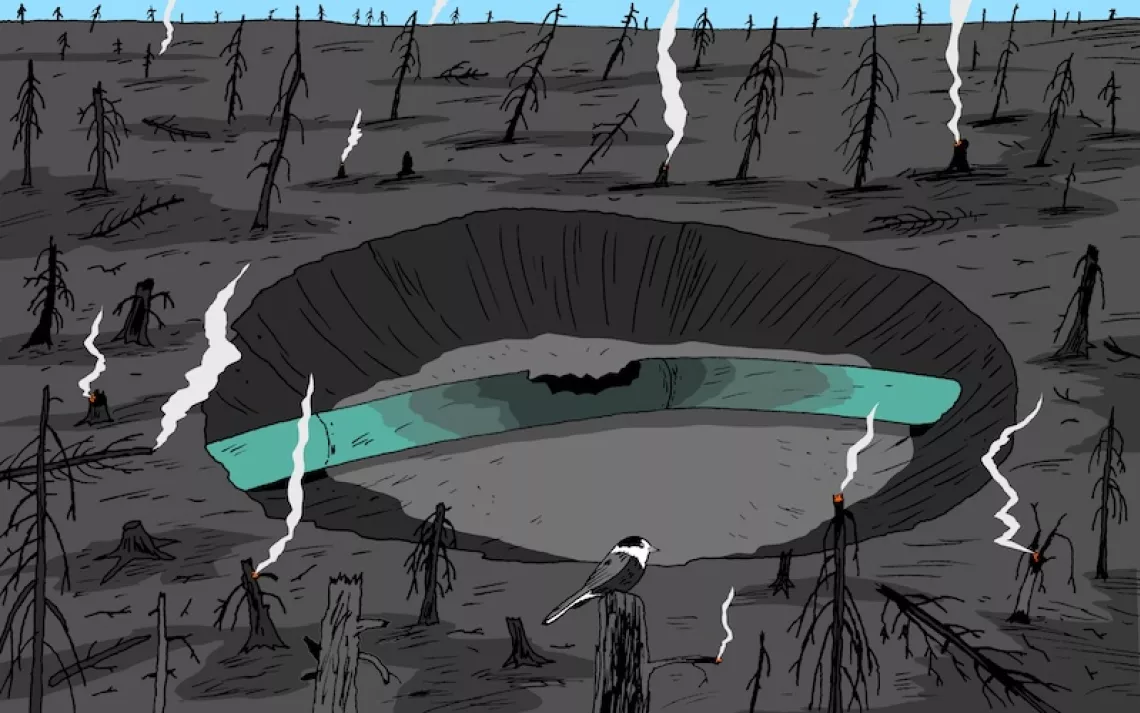Left Behind: Trump’s Paris Agreement Withdrawal Leaves the U.S. in the Dust
Trump’s decision threatens to isolate and impoverish us
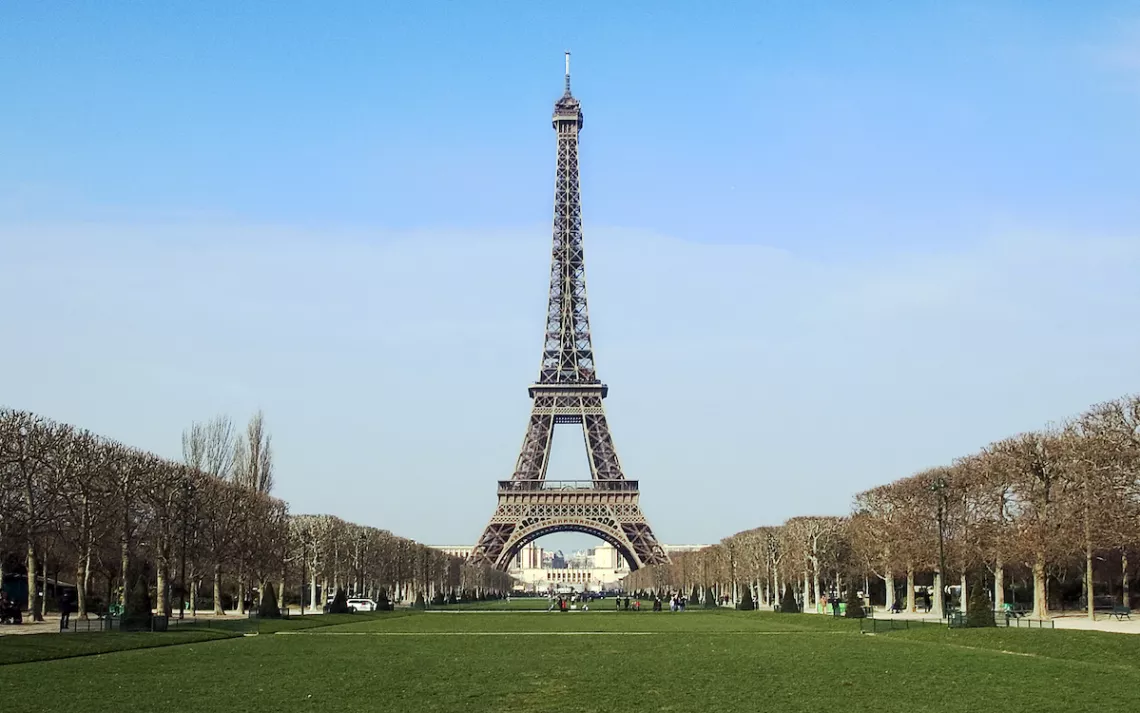
Photo by BWBImages/iStock
On Wednesday, something historic happened. Nearly two-thirds of ExxonMobil shareholders voted for a resolution calling on the company to disclose its business risks from climate change. For investors—including powerful asset-management firms like BlackRock and Vanguard—making plans to prepare for a warmer, wetter, drier, weirder planet is a no-brainer. The shareholder meeting in Dallas was yet another confirmation of what environmental groups have been saying for close to 20 years: Everyone has a responsibility to address the climate change crisis.
On Thursday, Donald Trump made an attempt to turn history backward. In an unprecedented retreat from the United States’ global leadership, President Trump announced that he was withdrawing the United States from the Paris climate agreement. “So we are getting out,” Trump said in a Rose Garden speech that he had trumpeted with the kind of sophomoric fanfare befitting a reality show. "But we will start to negotiate, and we will see if we can make a deal that's fair. And if we can, that's great. And if we can't, that's fine." The president continued: "I cannot in good conscience support a deal that punishes the United States, which is what it does. ... The bottom line is that the Paris Accord is very unfair at the highest level to the United States."
Make America great again? Not so much. If the president’s wish is to sustain American greatness, then mark this decision a total #fail.
The withdrawal from the landmark climate accord will diminish our international standing and alienate the United States from our allies. It is a stunning abdication of the United States’ moral responsibility to address global warming (since we are by far the globe’s biggest historical greenhouse gas emitter). It will almost certainly diminish our economic competitiveness. And, insofar as it slows efforts to slash greenhouse gas emissions, it will contribute to greater human misery and exacerbate the environmental destruction connected to rising temperatures and ocean acidification. The withdrawal from the Paris Agreement is crippling myopia parading as political courage.
In short: Trump’s decision to pull the United States out of the Paris Agreement threatens to isolate and impoverish America.
Perhaps the most stunning thing about Trump’s announcement is how starkly out of sync it is with the official and popular consensus on climate action. The chyrons scrolling across the bottom of the television broadcasts of the Rose Garden ceremony might as well have said, “Trump vs. Everybody.”
Because Trump’s retreat from the Paris Agreement leaves the U.S. out of step with the rest of the global community. There are only two countries on Earth that have not signed the Paris Agreement. One, Syria, is in the midst of a brutal civil war. The second, Nicaragua, objects on the grounds that the accords are far too weak. (Nicaragua expects to reach 90 percent renewable energy by 2020.) At the end of last week’s G7 meeting in Italy, the other major industrial powers “reaffirm[ed] their strong commitment to swiftly implement the Paris Agreement,” even as the U.S. remained a holdout. Tomorrow in Brussels, the EU and China are expected to issue a joint statement stating that the Paris deal “is an imperative more important than ever.”

Trump’s move has left allies stunned even as it has shocked U.S. foreign policy veterans. In a Wednesday press conference organized by the Sierra Club’s International Climate Program, Wendel Trio, director of Climate Action Network Europe, said Trump’s strategy was “bizarre” and compared it to a “declaration of war.” Writing for The Atlantic, Todd Stern, the Obama administration’s special envoy for climate, warned the move “would cause serious diplomatic damage.” Samantha Power, the former U.S. ambassador to the United Nations, said on Twitter that the retreat from the Paris Agreement marks nothing less than “the end of the American Century.” Even Trump’s own secretary of state, Rex Tillerson, disagreed with leaving the agreement. (Tillerson was notably absent at the Rose Garden ceremony.) When it comes to climate change, the U.S. is now a pariah nation.
Trump’s withdrawal from the Paris Agreement is also out of step with U.S. public opinion. According to a poll conducted by the Yale Program on Climate Change Communication, a majority of Americans in every state support U.S. involvement in the international accord. In response to Trump’s move, state and local leaders say they will keep doing what they can to continue cutting greenhouse gas emissions. On Wednesday, Governor Jerry Brown of California said the Golden State will “do everything to not only stay the course but to build more support [for climate action]—in other states, in other provinces, in other countries.” Also on Wednesday, the city of Orlando, Florida, joined the growing number of cities committing to transition to 100 percent clean energy. While Trump’s narrow-minded nationalism might play well with a certain segment of his political base, it’s a nonstarter for much of the rest of the country.
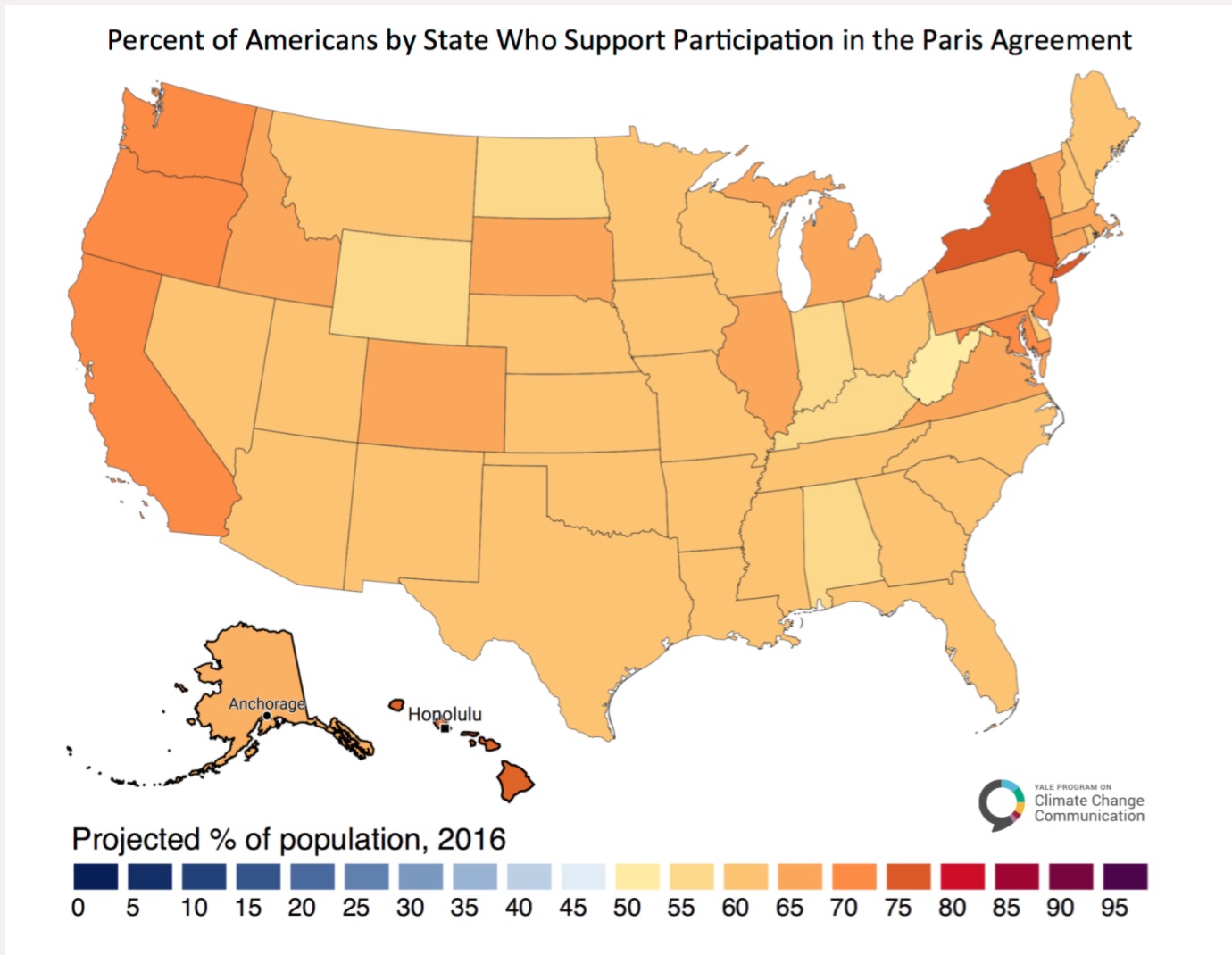
Trump’s Paris Agreement decision is also out of step with the corporate community. Companies big and small agree: Addressing the climate challenge and embracing the clean energy economy is simply smart business. In full-page newspaper ads placed last month, companies including Apple, Google, Microsoft, Johnson Controls, and Unilever called on the president not to abandon the Paris Agreement. In a letter to the White House, CEOs from 30 companies—including 3M, GE, Dow, and Campbell—called on the president to stay in the agreement. According to NRDC, one-third of the companies in Trump’s own manufacturing council (an advisory group of major CEOs) are urging him to stay in the agreement.
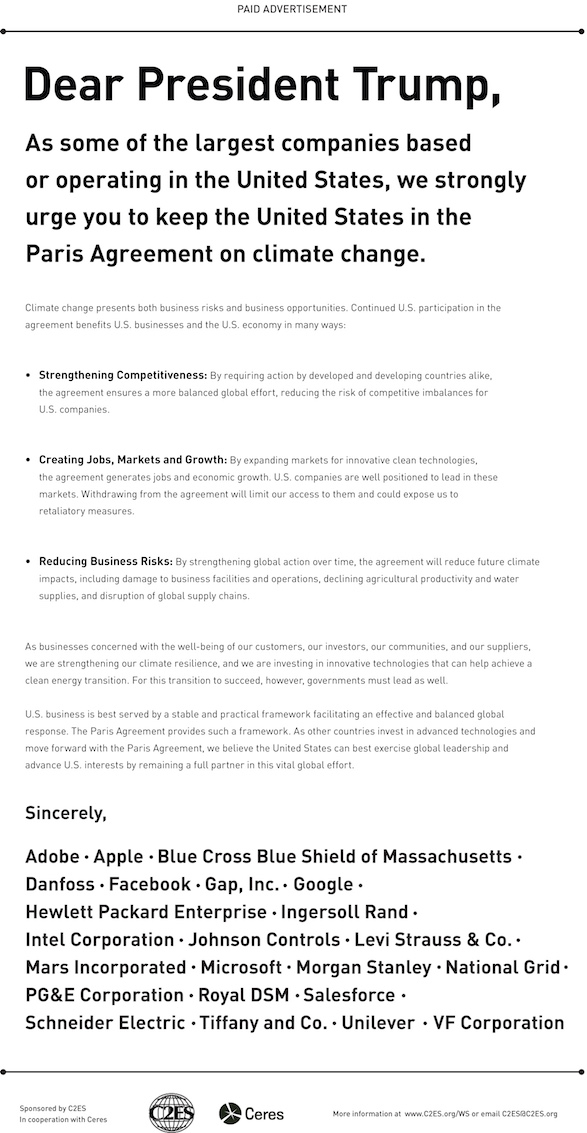
Perhaps most stunningly, Trump’s move is also out of step with major energy companies. ExxonMobil, BP, Shell, Statoil, and even coal companies like Peabody Energy and Arch Coal (!) are on the record expressing their support for the Paris accord.
The U.S. retreat from the Paris deal is a threat to the country’s economic interests as much as our diplomatic ones. With this move, Trump is turning the U.S. government’s back on what promises to be the greatest economic opportunity of the 21st century—the global transition from dirty energy to clean, renewable energy. According to a report released last month by Ernst and Young, China and India have now surpassed the U.S. as the most attractive countries for renewable energy investments. While this might be good news for the planet as a whole, it’s difficult to see how this is in the national interest of the United States. When it comes to clean energy, other countries are poised to eat America’s lunch.
And last, but certainly not least, Trump’s retreat from the Paris deal is out of sync with what scientists tell us is required to maintain a more-or-less stable climate. As Bill McKibben likes to say, there’s no negotiating with chemistry and physics. This New York Times graphic makes clear that keeping average global temperature rise below 2 degrees Celsius was going to be very difficult even with the U.S. pledges under the Paris agreement; the U.S. retreat will make it all nearly impossible. Trump’s brazen scientific know-nothingness all but guarantees hotter temperatures, more droughts, more intense storms, more powerful floods. It will push more species into the pit of extinction.
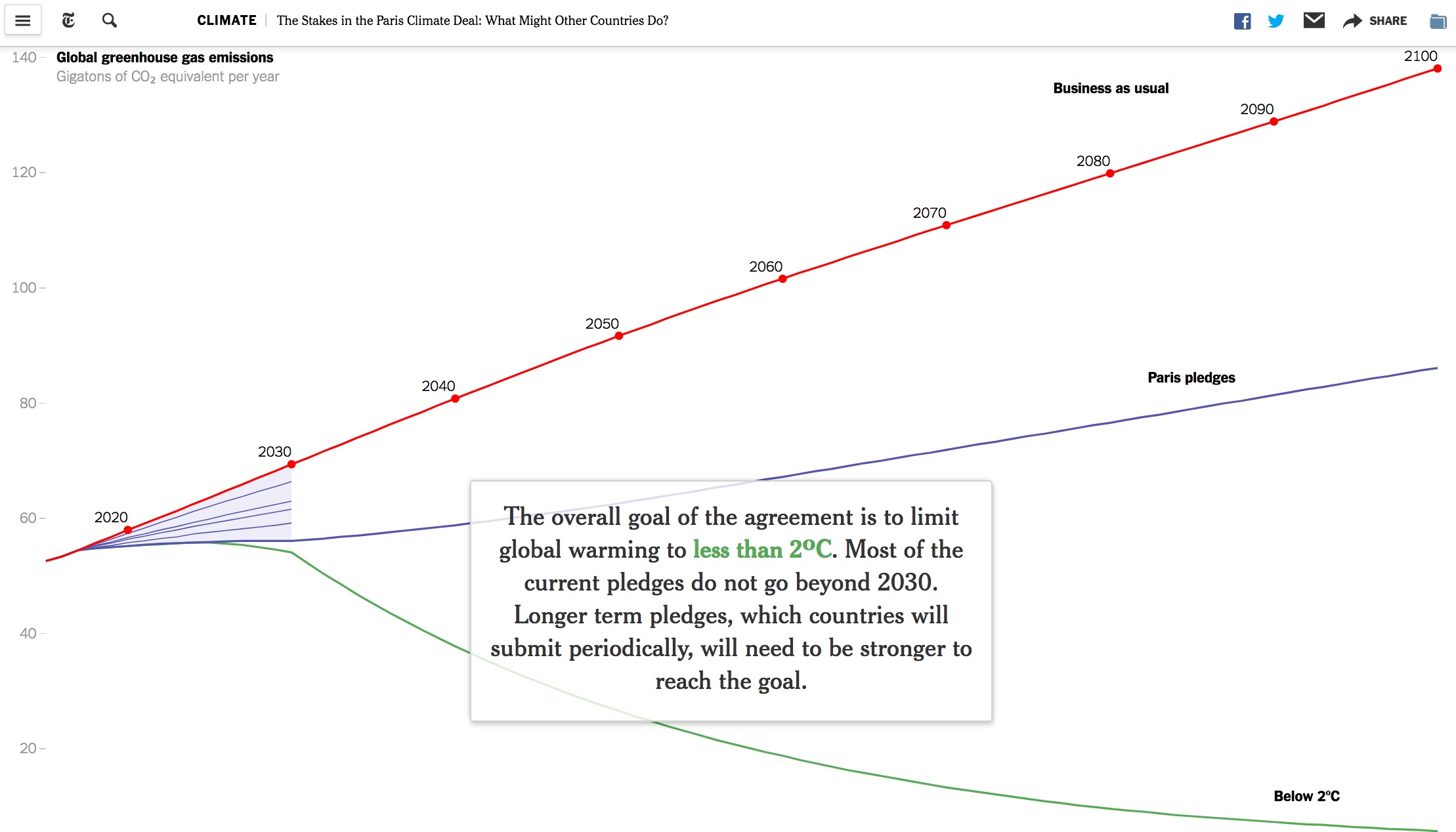
There’s no denying that with today’s move, Trump has reduced humanity’s chances of avoiding the worst climate change scenarios. He puts us closer to an overheated and angry world. And, despite all of the president’s bluster, the withdrawal is counter to U.S. interests. It looks increasingly likely that the United States will find itself eating other countries’ dust.
While acknowledging that today is a very bad day for the environment and for the country's stature in the world, environmental advocates are expressing guarded optimism that in a match pitting Trump vs. Everybody, the global majority will eventually prevail. The hope (such as it is) is that Trump’s recklessness will galvanize other nations, citizen-activists in the U.S., business leaders, and state and local officials to escalate their climate action efforts.
“The Paris Agreement was adopted after decades of climate advocacy by concerned citizens across America and around the world, and it certainly will not be derailed by the ignorance of one man,” Sierra Club executive director Michael Brune said in the organization’s official statement. In an email sent to me last night, Jamie Henn, the communications director of 350.org, wrote, “If Trump won't meet the goals of the Paris Agreement, it's up to the rest of us to try. . . . This is the part of the action movie where the villain you thought was defeated comes back to life and our heroes have to do what they never thought possible. That's always the most tense part of the film, but it's also the best. I'm confident we can rise to the occasion.”
This cautious hope is essential; it’s one of the most important sources of renewable energy we’ve got. The ExxonMobil shareholders, the CEOs who are committed to clean energy, the mayors and governors determined to slashing greenhouse gas emissions, and the hundreds of thousands of people who participated in the People’s Climate March—together they can form that fabled “second superpower” that counteracts the renegade and retrograde U.S. government.
 The Magazine of The Sierra Club
The Magazine of The Sierra Club
